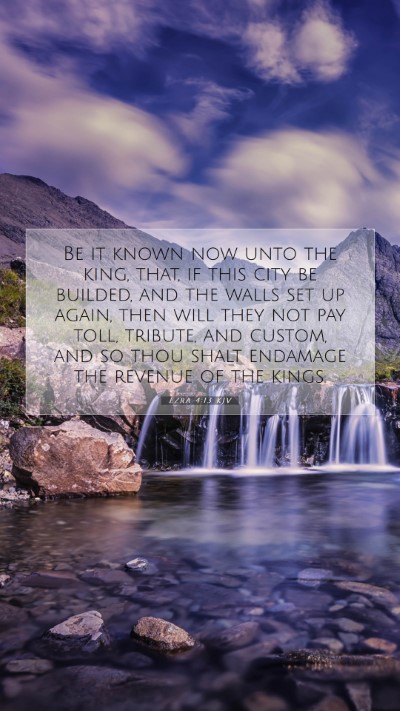Old Testament
Genesis Exodus Leviticus Numbers Deuteronomy Joshua Judges Ruth 1 Samuel 2 Samuel 1 Kings 2 Kings 1 Chronicles 2 Chronicles Ezra Nehemiah Esther Job Psalms Proverbs Ecclesiastes Song of Solomon Isaiah Jeremiah Lamentations Ezekiel Daniel Hosea Joel Amos Obadiah Jonah Micah Nahum Habakkuk Zephaniah Haggai Zechariah MalachiEzra 4:13 Meaning
What is the meaning of Ezra 4:13?
Be it known now unto the king, that, if this city be builded, and the walls set up again, then will they not pay toll, tribute, and custom, and so thou shalt endamage the revenue of the kings.
Ezra 4:13 Bible Verse Meaning
Understanding Ezra 4:13
Ezra 4:13 states the following: "Be it known unto the king that if this city be builded again, and the walls thereof set up, then will they not pay toll, tribute, and custom, and so thou shalt endamage the revenue of the kings."
Bible Verse Meaning
This verse comes at a time when the rebuilding of Jerusalem was under scrutiny. Enemies of the Jews were seeking to dissuade the king of Persia from allowing the construction of the city walls, which they believed would create an independent power that wouldn't pay tribute.
According to the insights from various public domain commentaries:
- Matthew Henry: He emphasizes the manipulative nature of the enemies of the Jews. They are using political tactics to provoke the king into halting the reconstruction efforts. Their argument is aimed at portraying the Jews as a rebellious group that would undermine the king’s authority.
- Albert Barnes: Barnes notes the concern of economic loss that the king might face if Jerusalem were to become fortified again. He suggests that the enemies of the Jews were playing on the king’s fears about losing revenue, employing a practical argument that had political implications.
- Adam Clarke: Clarke highlights the historical context surrounding this verse. He elaborates on the nature of the Persian Empire and how local governance often reflected the king's interests in maintaining loyalty and tribute from its subjects, fearing uprisings that could threaten economic stability.
Biblical Exegesis
When examining this verse in light of its historical context, we see a nation in the midst of rebuilding after exile, struggling against both external and internal forces. The adversaries' strategy was to appeal to the king’s financial interests rather than addressing the purpose of the Jewish people's return to their homeland.
Application of the Verse to Daily Life
This verse can serve as a reminder of the challenges we face when embarking on meaningful projects or reconstructive efforts in our own lives. Just as the Jews faced external opposition, individuals today may encounter resistance when pursuing goals that align with their faith and ideals.
Key Takeaways
- Rebuilding efforts may attract opposition, but perseverance is key.
- Understanding the motivations behind opposition can help you navigate challenges more effectively.
- Your endeavors for good may involve confronting fears and insecurities, similar to those faced by the Jews in Ezra's time.
In-Depth Bible Verse Analysis
This verse brings forth important themes relevant to both ancient and modern contexts:
- Fear of Autonomy: The concern that the rebuilt Jerusalem would challenge the king's authority reflects a common theme in governance—worry about losing control.
- Economic Implications: The intersection of religion and politics highlights how spiritual aspirations can influence economic structures.
- Historical Significance: This event signifies a pivotal moment in Jewish history as they sought to reclaim their identity and place within the world.
Cross-References
Ezra 4:13 relates to several other scripture passages that underscore similar themes:
- Nehemiah 2:17-20: Nehemiah responds to opposition as he embarks on rebuilding Jerusalem.
- Isaiah 54:17: Assurance that no weapon formed against those who aim to follow God's will shall prosper.
- Proverbs 21:1: The heart of the king is in the hand of the Lord, emphasizing God's sovereignty over rulers.
Through these depths of understanding, the meaning of Bible verses like Ezra 4:13 becomes clearer. Engaging in Bible verse commentary and seeking out resources allows us to gain valuable Bible study insights that enrich our Bible study groups, whether in person or through initiatives such as online Bible study.
Conclusion
To interpret difficult Bible passages like Ezra 4:13, it's important to grasp the historical context, understand the motivations of various parties involved, and reflect on how these lessons can be applied to personal challenges today. By employing effective Bible study tools and exploring meaning of Bible verses deeply, we meditate on the significance of scripture in both ancient and contemporary times.


